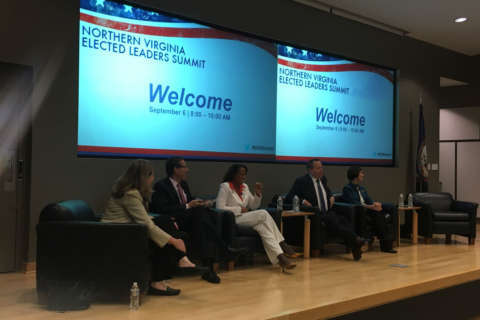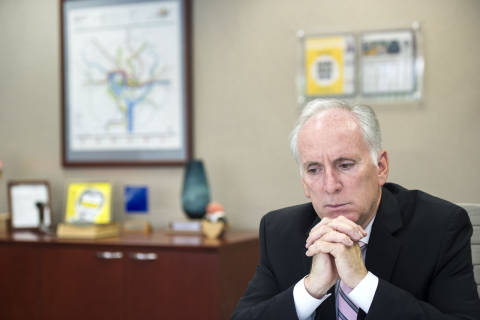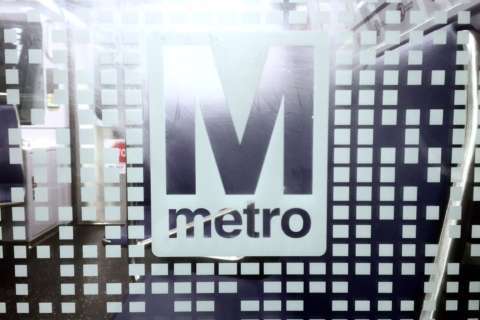WASHINGTON — Continued debate over Metro Board’s structure will likely derail any hopes for new, permanent dedicated tax funding for the agency in this winter’s General Assembly sessions, Metro and regional business leaders said Thursday.
Metro Board should be smaller and there should be more privatization or contracting as part of overall changes, said former D.C. Mayor Anthony Williams, now executive director of often-influential business group Federal City Council.
He and other colleagues do not expect new dedicated tax funding that Metro General Manager Paul Wiedefeld says is needed for major maintenance and repairs will become a reality this winter or spring, even after outgoing Virginia Gov. Terry McAuliffe said Wednesday he would at least include it in his two-year budget proposal in December.
“You start changing the governance, you start changing the expectations, you’re in a much better place to get the contribution from federal funding, to get the other funding over the long term we’re talking about,” Williams said.
He described the current structure as a “fundamentally flawed” system that encourages short-term thinking, although it is not clear how a smaller board would change that.
A number of key elected leaders have said governance and related changes are a prerequisite for any additional funding approvals, which, even then, would not be guaranteed.
The most visible recommendation on changes for Metro governance is former U.S. Transportation Secretary Ray LaHood’s recommendation that the Metro Board be reduced from eight members and eight alternates to five members.
While sitting Metro Board members have expressed some public opposition to the proposal, several were more vocal behind closed doors Thursday. A number of members are concerned about the loss of local representation on the board, and legal questions about how Metro could act under a smaller board without legal changes to the founding Metro Compact that would require approval in Maryland, D.C., Virginia and Congress, among other issues. LaHood’s final, detailed report is due within a few weeks.
Meanwhile, the Northern Virginia Transportation Commission has endorsed a 12-member board.
Also behind closed doors Thursday, but not at Metro headquarters, the regional Council of Governments’ Metro Strategy Group met and continued contentious discussions. The group did not show any public signs of progress on a potential agreement among local leaders on how to provide Metro with about $500 million per year in new dedicated taxes.
Maryland Gov. Larry Hogan has proposed a shorter-term fix with Maryland, D.C., Virginia and the federal government each contributing $125 million in additional capital cash over the next four years.
Federal City Council Chairman Ed Walter said some version of that plan could provide a one-year bridge, since it does not appear any new taxes will be agreed on in the General Assembly sessions that begin in January in Annapolis, Maryland, and Richmond, Virginia.
“I have a feeling that you may find that the governance piece has to happen first, and then funding; there may need to be some level of funding for a year and then a longer-term solution for funding,” Walter said.
But Metro Board Chairman and D.C. Council member Jack Evans worried continued short-term patches would simply lead to Metro continuing to slip. A 2005 study with many of the same conclusions that apply today to Metro’s governance, operations and long-term finances was essentially ignored even after then-General Manager Dick White told Congress that Metro risked falling into a “death spiral” within a decade.
“Dick wasn’t far off,” Evans said.
He added, “We are now talking about governance, which I think is going to distract us from talking about what I view as the real issue, [which] is how we’re going to pay for these long-term capital needs.”
In addition to the capital funding needs, Metro projects a need for additional local tax dollars for its operating budget for the year starting next July unless there are significant changes.
Wiedefeld is expected to formally present his initial budget proposal next month, well before there are any clear answers about state, federal or local funding. Evans suggested the budget proposal, at least initially, could include more fare hikes or service cuts. The board typically modifies the proposal over about six months based on new information, rider feedback and what jurisdictions are willing to pay.
Wiedefeld declined to specify what would be in his budget.
“My job is to identify the needs, articulate the needs and deliver the service … the policymakers have to decide how they react to that,” Wiedefeld said of the assessment by Evans and the Federal City Council leaders that dedicated funding is extremely unlikely to be agreed to this winter.
The business group’s Deputy Executive Director Emeka Moneme, who is a former District Department of Transportation director and Metro Board member, said the focus on governance first should be seen as fitting in with a funding push.
“It’s a false option that you either do governance or funding. They’re actually about the exact same issue. The funding problem isn’t a math problem: It’s a regional cooperation problem,” he said.
Moneme suggested that while difficult, the best solution would be for the region to rewrite the Metro Compact, a process that would likely take years.
The Metro Board also heard Thursday from a transit union consultant about the potential benefits of tax assessment districts around Metro stations that do not yet have them. The districts, which Fairfax and Loudoun counties set up around Silver Line stations and along Route 28, tax properties near the transportation systems so that the property owners who benefit the most from increased property values pay a share of the costs.
D.C. Metro Board member Tom Bulger again suggested Metro could get at least some additional funding by selling station naming rights.







